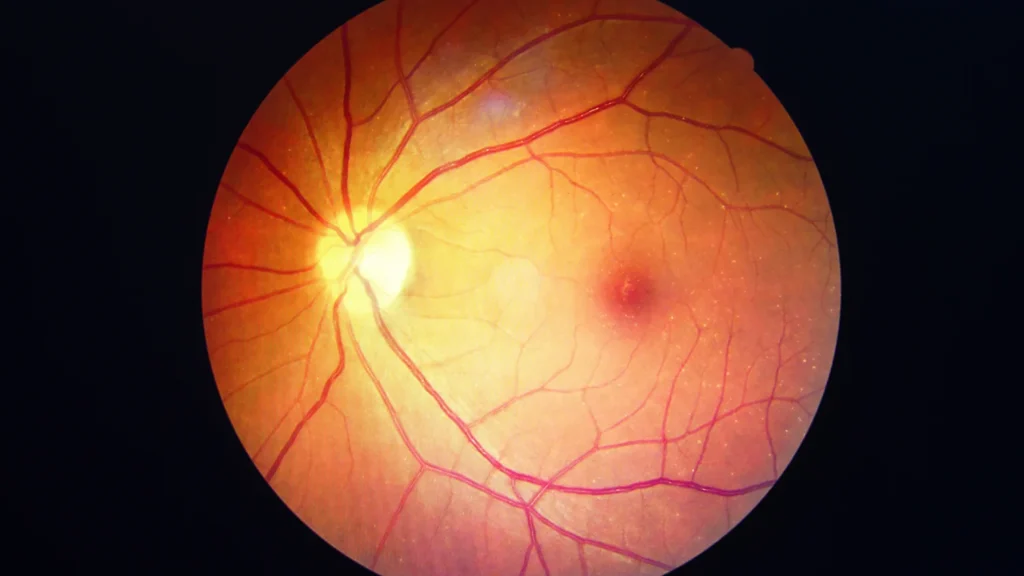A macular hole is a small, serious retinal condition that can significantly affect your central vision. It’s a progressive disease that, if left untreated, can lead to permanent vision loss. At Retina and Vitreous Surgeons of Utah (RSVU), our team of skilled and compassionate surgeons specializes in diagnosing and treating this delicate condition, helping to restore and preserve your sight. Understanding the causes, recognizing the symptoms, and knowing your treatment options is the first step toward protecting your vision.
What is a Macular Hole?
To understand a macular hole, it’s helpful to first understand the macula itself. The macula is a small, specialized area located in the center of the retina at the back of the eye. It is responsible for our sharp, central vision, which we use for tasks like reading, driving, and recognizing faces.
A macular hole is a tiny tear or break that forms in the macula. This happens when the vitreous gel, the jelly-like substance that fills the eye, pulls on the retina. As we age, the vitreous can shrink and separate from the retina. In most cases, this separation happens smoothly and without issue. However, if the vitreous is firmly attached to the macula, it can pull and tug, eventually causing a tear to form.
Causes and Risk Factors
The primary cause of a macular hole is the natural aging process of the eye. As the vitreous gel liquefies and shrinks, it can exert traction on the macula. Other factors can also contribute to the risk of developing a macular hole:
- Age: The condition is most common in individuals over the age of 60.
- Myopia (Nearsightedness): Highly nearsighted people may be at a higher risk.
- Eye Trauma: A direct injury to the eye can cause a macular hole.
- Diabetic Retinopathy: This diabetic complication can lead to vitreous and retinal changes, increasing the risk.
- Retinal Detachment: A macular hole can sometimes occur as a complication of retinal detachment.
Recognizing the Symptoms of a Macular Hole
Symptoms of a macular hole often appear gradually and can be subtle at first. However, as the hole widens, the symptoms become more pronounced. Early detection is key, as it can lead to a better treatment outcome. Common symptoms include:
- Distorted or Blurry Central Vision: Straight lines may appear wavy or bent.
- Difficulty Reading Small Print: This is often one of the first signs patients notice.
- A Small Blind Spot (Scotoma): A blank or gray spot may appear in the center of your vision.
- Metamorphopsia: Objects may appear a different size or shape than they truly are.
- Difficulty with tasks requiring sharp vision, such as driving.
It’s important to note that a macular hole does not cause pain or redness in the eye. If you experience any of these symptoms, especially in one eye, you should schedule a comprehensive eye exam with a retinal specialist immediately.
Diagnosis and Treatment Options
A retinal specialist will perform a thorough eye exam to diagnose a macular hole. This typically includes a visual acuity test, a dilated eye exam to view the retina, and an Optical Coherence Tomography (OCT) scan. The OCT scan is a non-invasive imaging test that provides a cross-sectional view of the retina, allowing the surgeon to see the hole in detail and determine its size and stage.
The standard and most effective treatment for a macular hole is a surgical procedure called a vitrectomy. A vitreoretinal surgeon performs the procedure. During a vitrectomy, the surgeon removes the vitreous gel that is causing traction on the macula. They then fill the eye with a special gas bubble. The surface tension of this gas bubble helps to gently push the edges of the macular hole together, allowing it to heal.
After the surgery, the patient must maintain a specific face-down position for a certain period, which can last from a few days to a few weeks. This positioning is crucial for the success of the surgery, as it ensures the gas bubble remains in contact with the macula to facilitate healing. Over time, the gas bubble is absorbed by the body and replaced by the eye’s natural fluid.
Why Choose Retina and Vitreous Surgeons of Utah (RSVU)?
Choosing a highly experienced and specialized team is essential when dealing with a delicate condition like a macular hole. The surgeons at Retina and Vitreous Surgeons of Utah (RSVU) have extensive training and expertise in treating complex retinal diseases. We use the latest diagnostic and surgical technologies to ensure the best possible outcomes for our patients. Our commitment is to provide compassionate, personalized care, guiding you through every step of the process from diagnosis to recovery.
If you are concerned about your vision or have been diagnosed with a macular hole, don’t hesitate to seek expert care. Early intervention is the key to preserving your central vision. Contact our office today to schedule a consultation with one of our specialists.

